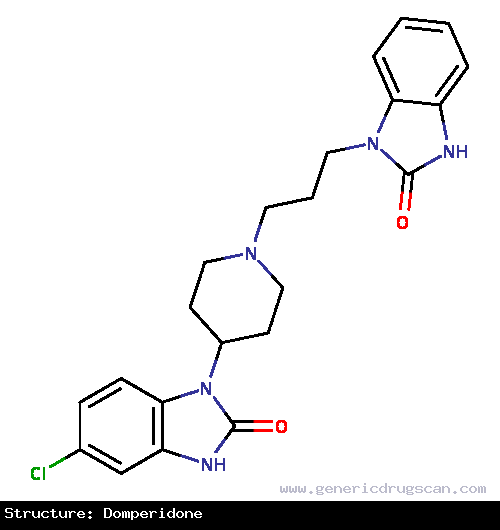Domperidone Drug: Indication, Dosage, Precaution, Side Effect , Storage, Category Type and corresponding Brands - www.genericdrugscan.com
Domperidone
Drug Status in Canada : ApprovedIndication : Why is this medication prescribed?
Symptomatic relief of acute nausea and vomiting. Gastric motility disorders such as reflux oesophagitis and duodenogastric dyspeptic symptoms.Contraindication: What are the special precautions to be followed?
Under following conditions, use of this medication is inadvisable. Its use should be withhold as it would cause harm to the patientHypersensitivity. GI haemorrhage, obstruction and perforation, patients with prolactin releasing pituitary hormone, chronic admin or routine prophylaxis of postoperative nausea and vomiting.
Other Precaution to be observed while taking this medication
Phaeochromocytoma, children below two year, elderly, renal or hepatic impairment. Risk of cardiac arrhythmias and hypokalaemia if administered IV. Pregnancy and lactation.What are possible side effects of this medication ?
Drowsiness, extrapyramidal reactions, galactorrhoea, gynaecomatia, constipation or diarrhoea, lassitude, decreased libido, skin rash, itch. Convulsions, arrhythmias and cardiac arrest, dysrrehythmias in patients with CV disease or hypokalaemia, patients on cancer chemotherapy. Seizure, hypertensive crisis in patients with phaeochromocytoma.Drug Category/Class
- Antiprotozoal Agents
- Dopamine Antagonists
- Agents Against Protozoal Diseases
- Drugs for Functional Gastrointestinal Disorders
- Propulsives
- Cytochrome P-450 CYP1A2 Inhibitors
- Cytochrome P-450 CYP1A2 Inducers
- Cytochrome P-450 CYP2C8 Inhibitors
- Cytochrome P-450 CYP2C8 Inducers
- Cytochrome P-450 CYP2B6 Inducers
- Cytochrome P-450 CYP2B6 Inhibitors
- CYP2B6 Inhibitors (strong)
- Antiemeti
| Prescribed | For management of dyspepsia, heartburn, epigastric pain, nausea, and vomiting. |
| Weight : | 425.911 |
| Structure | Domperidone |
 | |
| Formula | C22H24ClN5O2 |
Domperidone has 256 Brands listed
Search Generic Drugs alphabetically
